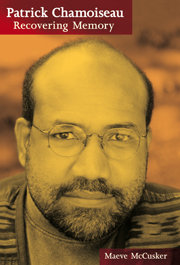Book contents
- Frontmatter
- Contents
- Acknowledgements
- Abbreviations
- Introduction
- 1 Beginnings: The Enigma of Origin
- 2 ‘Une tracée de survie’: Autobiographical Memory
- 3 Memory Re-collected: Witnesses and Words
- 4 Memory Materialized: Traces of the Past
- 5 Flesh Made Word: Traumatic Memory in Biblique des derniers gestes
- Afterword
- Notes
- Bibliography
- Index
3 - Memory Re-collected: Witnesses and Words
- Frontmatter
- Contents
- Acknowledgements
- Abbreviations
- Introduction
- 1 Beginnings: The Enigma of Origin
- 2 ‘Une tracée de survie’: Autobiographical Memory
- 3 Memory Re-collected: Witnesses and Words
- 4 Memory Materialized: Traces of the Past
- 5 Flesh Made Word: Traumatic Memory in Biblique des derniers gestes
- Afterword
- Notes
- Bibliography
- Index
Summary
The relationship with the past is one of the most fraught aspects in the negotiation of a postcolonial identity, and indeed history is frequently figured in postcolonial writing as a restraining or a restrictive force. For Joyce's Stephen Dedalus history, famously, is the nightmare from which he wants to awake, while Salman Rushdie's Saleem Sinai describes himself as being ‘handcuffed to history’ on the opening page of Midnight's Children. Such images of entrapment or restraint testify to the oppressive ‘presentness’ of the past in the postcolonial imaginary. As we have already seen, in the context of the Caribbean – where a historical consciousness has been even more radically disturbed by the traumas of genocide, transplantation and slavery – many writers have conceded the irrecoverable nature of history, and have attempted accordingly to recreate a sense of collective memory in their work. Dominique Chancé argues that while Glissant is the writer who has most systematically theorized the question of history, ‘la plupart des romans antillais prennent sens dans une même quête du temps et d'une mémoire collective’, a theme which gives contemporary literature much of its coherence. But the prevalence of this generalized obsession with the past means that many contemporary writers simultaneously strain to escape what Derek Walcott calls the New World ‘servitude to the muse of history’. This double bind means that they can appear to be oppressed by the overwhelming presence of the past, while at the same time being haunted by its (apparent) dereliction.
- Type
- Chapter
- Information
- Patrick ChamoiseauRecovering Memory, pp. 76 - 100Publisher: Liverpool University PressPrint publication year: 2011

